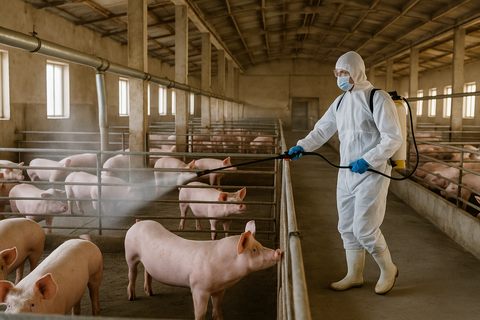African Swine Fever (ASF) is on a completely different level!
It's an incurable disease with a 100% fatality rate — the “cancer king” of the swine world.
Foreign media have warned that if Taiwan's defense line fails, the nation's multibillion-dollar pork industry could collapse entirely — and that impact extends far beyond pig farmers. It would shake consumer confidence and threaten the very foundation of Taiwan's swine industry and our dining tables.
The industry must abandon the old mindset of “treatment and control” and adopt a new strategy of “absolute prevention and proactive deployment.”
This new approach demands stronger, more expensive biosecurity technologies than those used during the FMD era. Therefore, every technological investment must be justified through value enhancement, ensuring that even under soaring biosecurity costs, the industry remains economically sustainable.
The strategic core of Taiwan's livestock industry has shifted — from pursuing output to building resilience.
Our mindset must evolve — from “treatment” to “total prevention and sustainable defense.”
🧱 Disease Control Is Modern Warfare
When ASF first broke out in China in 2018, Taiwan conducted extensive research and established defensive measures. However, the situation has changed.
Borders have reopened, global exchanges have resumed, food logistics are nonstop, and online commerce is pervasive. Although airport inspections appear strict, public vigilance has declined. Taiwan’s disease prevention strategies must now evolve with the times.
We sincerely urge support for the Ministry of Agriculture's latest prevention policy.
We are all in this together — one island, one fate.
Although ASF is a terrifying and incurable disease, it is preventable. With full cooperation among the national disease control system, industry groups, and the public, we can stop the infection chain — kitchen waste — from ever reaching pig farms. As long as no pigs consume pork products contaminated with ASF virus, the disease will never take root in Taiwan.
🛡️ Dual Defense Lines: From GPS Tracking to Biocontrol
Modern epidemic prevention is no longer about simply drawing a cordon line — it's a technological and microbial war.
First Defense Line: Digital Biosecurity
The government has elevated epidemic control to a national strategic level by implementing a GPS tracking system for live pigs and carcass transport vehicles.
This system functions like a virus radar — when an outbreak occurs, it enables traceability between farms and transport routes in real time.
What does this mean?
Smart monitoring is no longer optional; it's a compliance and survival requirement.
Farms lacking digital traceability may be deemed high-risk during emergencies.
Second Defense Line: Biocontrol in the Microbial World
External tracking isn't enough — the true fortress must be built from within.
ASF can spread through kitchen waste, arthropods, bodily fluids, or contaminated vehicles and personnel.
Hence, biosecurity must be strengthened at every level.
The hottest trend now is Biocontrol — not science fiction, but real-world microbiological application.
Through the integration of microbial technology, probiotics, and environmental management, it reduces pathogen load, improves gut microbiota, and enhances air quality.
Simply put — use good microbes to suppress bad ones.
This approach not only boosts animal health but also reduces antibiotic dependence — aligning perfectly with the global “antimicrobial reduction and sustainability” movement.
It marks Taiwan's shift from passive disease prevention to active health enhancement.
Facing highly infectious diseases, Biocontrol has become a crucial direction for livestock farms to strengthen protection and maintain production stability.
By applying microbial technology, probiotics, and environmental management, the industry is moving toward a lower-risk, low-carbon, and sustainable biosecurity model.
🧩 Implementing Biosecurity: From Facility to Management
Livestock farms across Taiwan have upgraded multiple prevention measures, including:
-
Strict access control and personnel disinfection to block external pathogens
-
Regular facility cleaning and mist disinfection to maintain a low-risk environment
-
Enhanced feed and vehicle management to prevent cross-farm contamination
-
Improved environmental monitoring and pathogen alert systems for early response
With biocontrol technologies — such as using beneficial microbes to lower pathogen load, balance gut flora, and purify air — farms can improve animal health, reduce antibiotic use, and fully align with the global antimicrobial-reduction trend.
🌱 From Biosecurity to Competitiveness: Biocontrol as an Industry Game-Changer
Biocontrol is not only a disease prevention tool but also a strategic driver for Taiwan's livestock industry upgrade.
Through microbial science, green feed innovation, and circular resource utilization, producers can simultaneously reinforce epidemic resilience, enhance animal welfare, and create ESG value.
2026 Taiwan Livestock Expo & Forum
📅 May 6–8, 2026 | ICC Tainan
With the theme “Biocontrol × Antimicrobial Reduction × Environmental Resilience,”
the event will showcase Taiwan's latest achievements in animal health and sustainable biosecurity —
paving the way toward a more resilient new era for the livestock industry.
